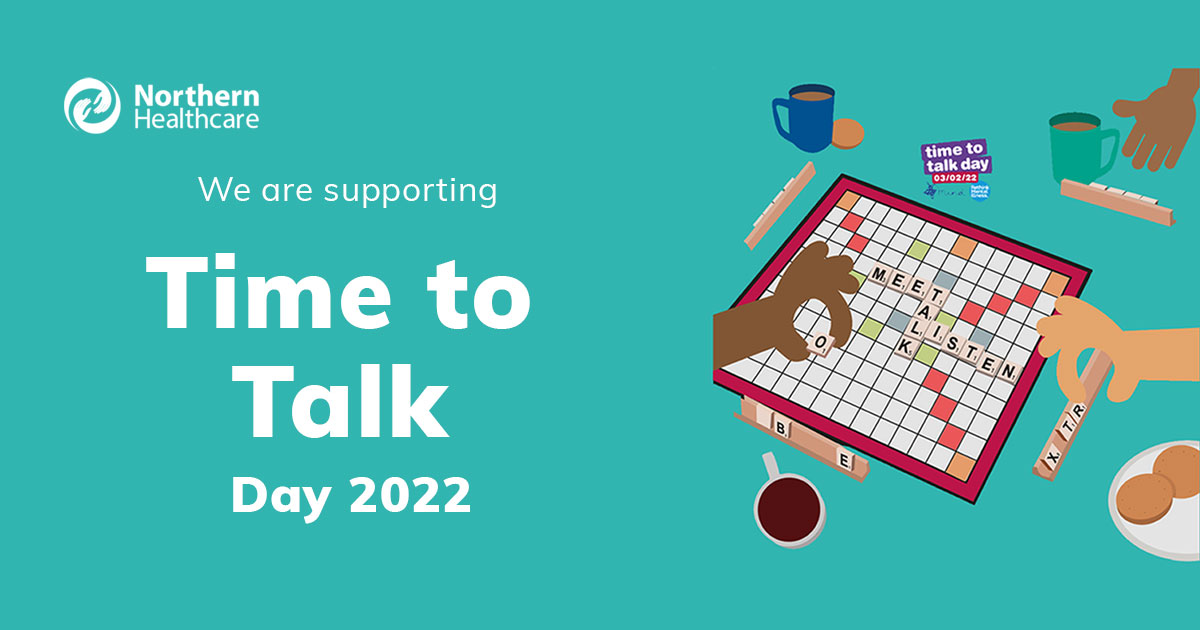
February 3rd 2022 is Time to Talk Day, previously led by Time to Change, this year the campaign is being guided by charity partners Mind and Rethink Mental Illness , in partnership with Co-op.
Time to Talk Day encourages us to talk about mental health and start a conversation with someone, no matter how we do it. This blog focuses on conversation starters, and how we can get talking.
Talking openly about mental health is important to help reduce the stigma surrounding it. If we continue to keep the conversations going, more and more people will feel comfortable talking about their feelings and experiences and asking for help and support if they need it.
Read more about the stigma surrounding mental health conditions and the impact it can have on recovery.
Starting a conversation about mental health may feel difficult, but it doesn’t have to be. Simply ask someone, “How are you?”.
It’s common to say “I’m fine” even when we’re not, because we may feel like a burden or like the person asking us isn’t really interested.
Time to Change, led by Mind and Rethink Mental Illness, encourage us to “Ask Twice”, as a second “how are you?” can make all the difference.
Here are some more conversation starters that you can use to start a dialogue.
Start the conversation with a topic that isn’t related to mental health:
Let someone know you’re there for them:
Open ended questions to start a conversation:
You can also share your own experience of mental health if you feel comfortable doing so. This will show others that you are open to talking.
Here are some top tips for approaching a conversation about mental health with someone:
There is a stereotype that conversations about mental health are usually formal, for example, you may discuss the topic with your GP or with a councillor or therapist.
But your conversation doesn’t have to be formal – in fact, starting a conversation with someone while doing an everyday activity may help the person to relax and feel more comfortable.
Try starting a conversation over lunch, when cooking dinner or when you’re out for a walk.
Asking questions can allow the person to open up and express their feelings. Asking questions also shows that you are engaged and interested in listening to and understanding what the person is sharing with you.
Active listening is a skill that is beneficial to develop and work on, as actively listening is just as important as talking.
Active listening is making a conscious effort to understand the deeper meaning and the message behind what is being communicated to you, and not just hearing the words being said. Use cues to show that you are listening, something as simple as nodding your head in acknowledgement, or asking a question to reflect on what has just been said. Ask for clarification if you are unsure what they mean at any point.
It can be tempting to offer advice and solutions when someone is opening up to you about their feelings when going through a tough time. We don’t like to see those close to us struggling, so our natural urge may be to try and help them.
However, sometimes people just want a friendly, trustworthy ear; they may not be looking for advice, or they may have tried your suggested techniques already. Unless the person has asked for advice directly, just listening can be very powerful.
If you are unsure if the person would welcome advice, you can ask them, “Are you looking for advice or would you just like to chat?”
Talking about mental health can be daunting and vulnerable, especially at first. Displaying kindness and patience can help the person to feel safe and comfortable.
Don’t push – if the person is not ready to talk, that’s okay. In addition, the fact that you have opened up the conversation, even if they don’t want to talk right now, shows that you will be there for them if and when they do feel ready to talk.
The Time to Talk Day website has a variety of resources that you can download, from posters and bunting to conversation starters and an interactive bingo sheet.
You could organise a community event to start a conversation within your local area, whether in person or online.
Why not host a coffee morning and have a chat over tea and cake, or hold an arts and crafts session or a group walk?
You can also get involved on social media, share how you’re getting involved and join in the conversation with the hashtag #TimetoTalk.
Mind provide confidential mental health information services, including helplines, crisis resources and emergency advice.
You can email [email protected] or call 0300 123 3393 (Monday to Friday, 9am to 6pm, excluding Bank Holidays) for information on mental health problems, treatments available, and where to get help near you.
Rethink Mental Illness offer an advice and information service via their webchat (Monday to Friday, 9:30am to 4pm), or you can email [email protected] or call the freephone line on 0808 801 0525 (1pm to 4pm). The services can provide information and advice on living with mental illness, medication, treatment and care, carers rights, and The Mental Health Act, amongst other topics.
This Time to Talk Day, have a conversation about mental health, however you do it.